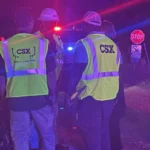Biden Administration’s Commitment to Rail Infrastructure
In an announcement made on Monday, the Biden administration revealed it has allocated over $1.4 billion for initiatives aimed at enhancing railway safety and increasing capacity. A significant portion of these funds originates from the 2021 infrastructure legislation.
Secretary Buttigieg on the Nationwide Rail Initiative
Transportation Secretary Pete Buttigieg stated, “These initiatives will not only improve the safety and reliability of American rail systems but also enhance resilience, delivering tangible benefits to numerous communities with railroads and fortifying supply chains across the nation.”
National Rail Safety and Recent Incidents
This substantial funding is directed towards supporting 70 projects spanning 35 states as well as Washington, D.C. Rail safety has assumed a prominent national concern, particularly following a hazardous chemical-laden train derailment and subsequent fire in East Palestine, Ohio, back in February. President Joe Biden has directed federal agencies to hold Norfolk Southern, the train operator, accountable for the incident. Nevertheless, a package of proposed rail safety reforms remains gridlocked in the Senate, awaiting a vote. The White House additionally expresses concern that potential government shutdowns, spurred by House Republicans, could compromise railway safety.
Core Railway Enhancements and Weather Resilience
The initiatives encompass enhancements to tracks and bridge maintenance, as well as bolstering railway interconnectivity and fortifying routes against severe weather conditions.
Reviving Gulf of Mexico Rail Services Post-Katrina
A substantial $178.4 million is earmarked for the revival of passenger services in certain regions of Alabama, Louisiana, and Mississippi along the Gulf of Mexico, which have been dormant since the onslaught of Hurricane Katrina in 2005.
Senator Wicker’s Remarks on Gulf Region Connectivity
Sen. Roger Wicker, R-Miss., commented, “This marks a pivotal moment, the culmination of relentless efforts to bridge our communities that were severed by the impact of Hurricane Katrina. The reintroduction of passenger rail services will catalyze job creation, elevate living standards, and present an efficient mode of transport for tourists, fueling our area’s economic resurgence and vibrancy.”
Collaborative Efforts to Reintroduce Gulf Coast Passenger Services
Following an agreement between Amtrak, CSX, and Norfolk Southern railroads last year, this grant paves the way to rejuvenate passenger services along the Gulf Coast on tracks primarily owned by these freight rail companies.
Rail Passengers Association’s Long-standing Commitment
Rail Passengers Association President & CEO, Jim Mathews, reflected, “Our persistent endeavors to bring back passenger trains to the Gulf Coast, disrupted since Hurricane Katrina, spanned 17 arduous years. This journey was riddled with challenges and setbacks but also punctuated by jubilant instances where regional and national stakeholders united under the shared aspiration for a more interlinked Gulf Coast.”
Key Grant for the Palouse River & Coulee City Railroad
Among other significant grants, the Palouse River & Coulee City Railroad in Washington state has been allocated $72.8 million. This will be used to modernize the track and accompanying infrastructure, enabling it to accommodate the contemporary 286,000-pound railcars.
Kentucky’s Infrastructure Upliftment Project
In Kentucky, a project has been earmarked to receive $29.5 million. This will facilitate enhancements to 280 miles of track and associated infrastructure along the Paducah and Louisville Railway.
Bridge Refurbishment Projects in Tennessee
Meanwhile, Tennessee will benefit from a $23.7 million grant, which will be directed towards the refurbishment of approximately 42 bridges across 10 distinct short-line railroads.


